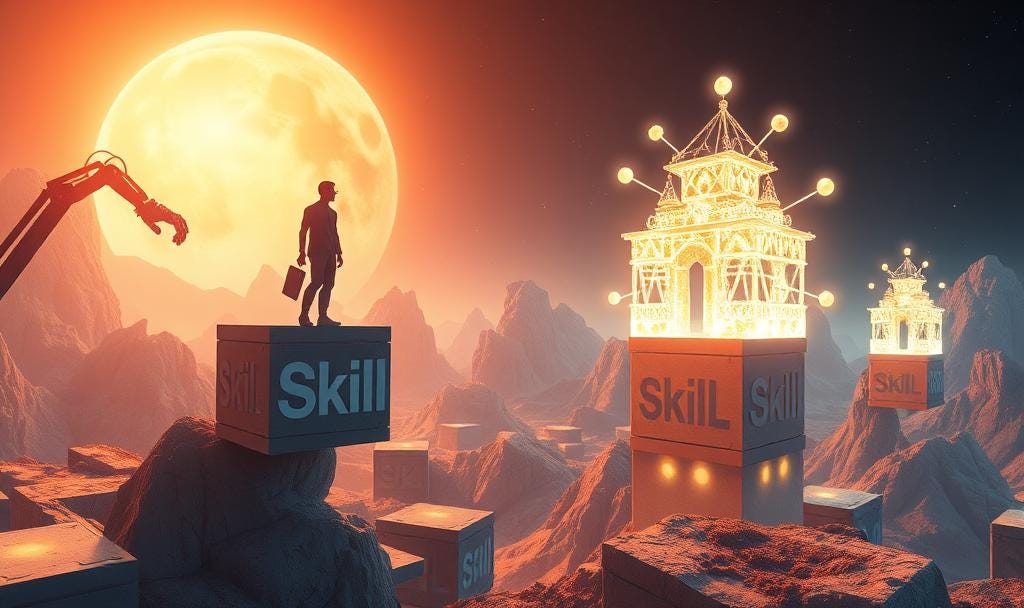AI Will Replace Skills, Not Careers—Unless You Let It
AI is eating skills, not jobs. But unless you understand what’s being replaced and how to evolve, your career might be next. This is your blueprint to stay irreplaceable.
“Your job won’t be replaced by AI—but every task you do inside it probably will.”
Imagine walking into your office tomorrow and discovering that nearly everything you considered “your work” has been quietly delegated to intelligent agents. The spreadsheets you spent mornings formatting, the reports you meticulously proofread, the presentation decks you assembled slide by slide—none of these stand unscathed. AI copies your writing style, digests your data, and crafts polished visuals in seconds. It doesn’t seek a promotion; it simply executes, error-free and tirelessly.
This is not a dystopian future two decades away, but the reality unfolding in boardrooms and remote teams around the globe today.
What once felt like a distant promise—machines that think, write, and plan—has become a pressing challenge: the unbundling of work into discrete tasks that can be automated with startling precision. Each routine process is inventoried, assessed, and either eliminated or handed off to an algorithm.
As these micro-tasks evaporate, entire segments of traditional roles begin to hollow out. The rising tides of automation don’t drown careers outright; they corrode them from within, layer by layer, until professionals question their unique value.
Yet amid the clatter of keys and the hum of servers, a profound opportunity emerges. If you treat this wave of automation as an existential threat, you guarantee your own obsolescence. But if you recognize it as a signal—a call to refocus on the tasks machines can’t touch—you reclaim the narrative. The calculus shifts from “What parts of my job will disappear?” to “Which facets of human ingenuity will become indispensable?” AI excels where rules are clear and data is abundant. We excel where ambiguity reigns, contexts shift, and moral judgments matter.
The choice is stark: be consumed by the scalpel of automation or rise as an architect of augmentation, orchestrating the collaboration between human judgment and machine power.
The time to decide is now.
In this issue of Brewed for Work, we dissects how AI is unbundling skills from careers—automating granular tasks while elevating the demand for integrative, human-centric capabilities. It offers a practical framework to identify vulnerable skillsets, develop enduring meta-skills, and retool your career path for long-term relevance in an AI-native economy.
So grab your favorite mug, and let's get brewing!
Today’s Issue at a Glance:
Automation Is Coming for Skills, Not Job Titles
Skill-sets That Are Actively Being Cannibalized
The Skills AI Still Can’t Replace—and May Never Will
Upskilling Framework: How to Evolve With the Machines
The Career OS of the Future: Antifragility, Not Stability
Welcome to Brewed for Work, 🔒subscribers-only🔒 offering by The Percolator dedicated to professional growth and upskilling. Each week we share essays, insights and resources to aid you in your work-life.
🚀
Now, you can Upgrade your Subscription for Free when you Invite your Friends to Subscribe to The Percolator
For generations, technological revolutions have reshaped the world of work: the steam engine propelled the Industrial Age, assembly lines defined modern manufacturing, and personal computers ushered in the Information Era.
Each wave disrupted tasks once thought irreplaceable, yet new roles emerged in tandem. Today, we stand at the cusp of a far more radical transformation. Agentic AI—autonomous systems capable of complex decision-making, learning, and execution—no longer merely assists us; it undertakes entire workflows. It drafts marketing copy, analyzes financial data, writes and tests code, schedules meetings, and even offers preliminary legal advice. The question no longer centers on whether AI will take our jobs, but on which skills within those jobs it will usurp first.
This seismic shift compels a reframing of career strategy.
In the past, we optimized for job titles: upskill for “accountant,” “software engineer,” or “project manager.” Tomorrow demands a focus on the constituent skills that comprise those titles. When AI systematically erodes the most formulaic, data-heavy, and rule-based components of our work, simply holding a title provides little shelter.
The true security lies in cultivating the abilities that machines cannot emulate—integrative judgment, systems thinking, ethical reasoning, emotional intelligence, and creative synthesis.
Yet it would be a mistake to view this transition through a purely defensive lens. The automation of granular tasks frees us from the drudgery of routine, granting unprecedented bandwidth to pursue higher-order work. Rather than lamenting the decline of repetitive tasks, ambitious professionals can redirect their energies toward roles that require strategic orchestration of AI agents, human-centered design, and moral stewardship.
In effect, we must evolve from task executors to outcome designers—architects who define objectives, orchestrate machine-driven processes, and interpret nuanced results.
The era of agentic AI is not an extinction event for human labor; it is, paradoxically, the gateway to a new realm of professional opportunity—reserved for those bold enough to redefine their value in terms of strategic judgment, creative insight, and ethical accountability.
Now is the moment to realign your trajectory: to outthink the machines by focusing on what makes us irreplaceably human.
Keep reading with a 7-day free trial
Subscribe to The Percolator to keep reading this post and get 7 days of free access to the full post archives.



